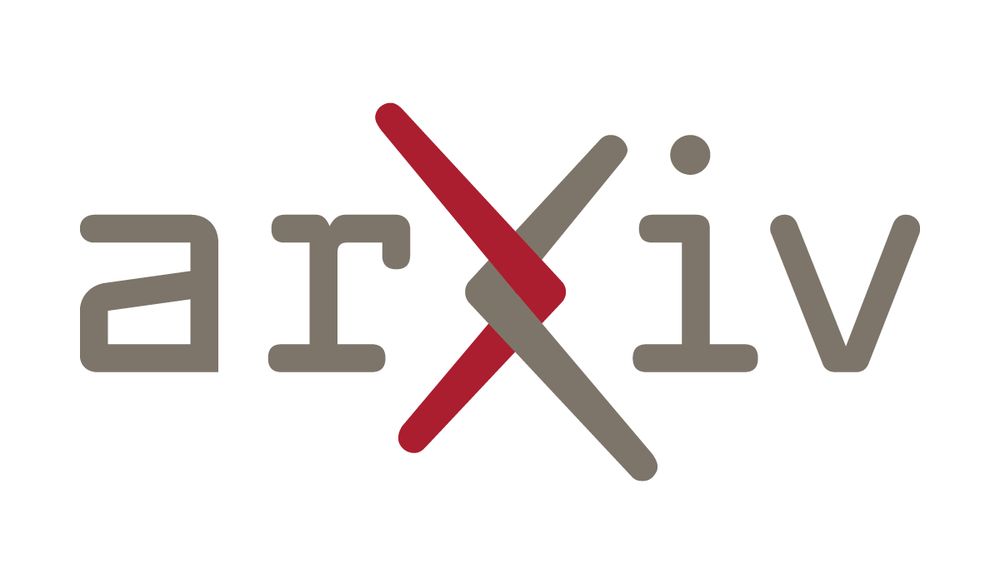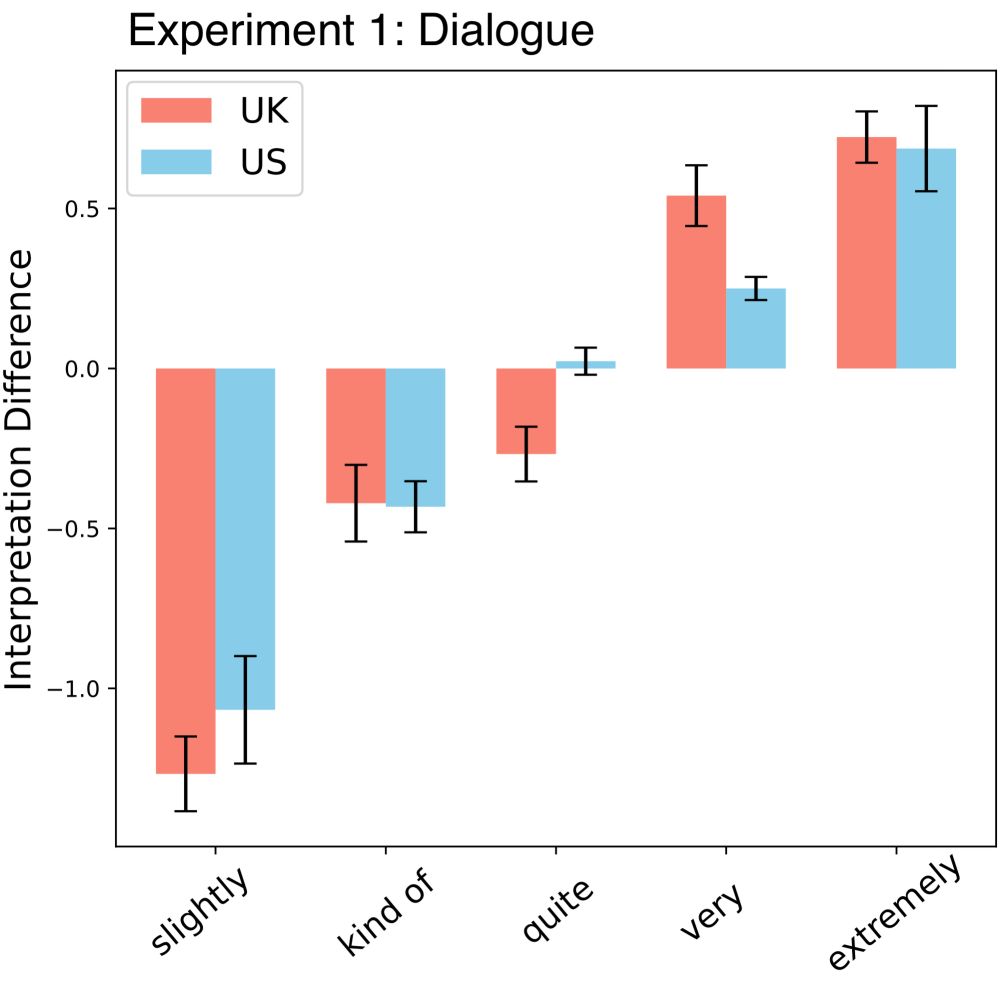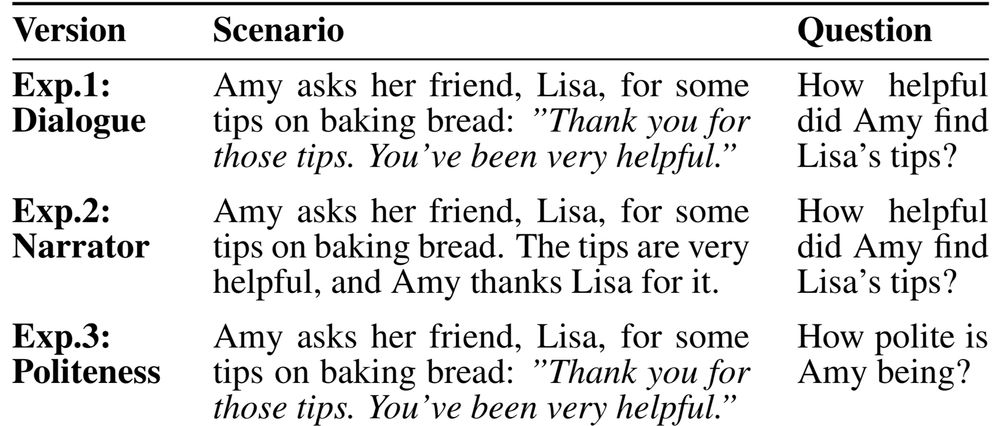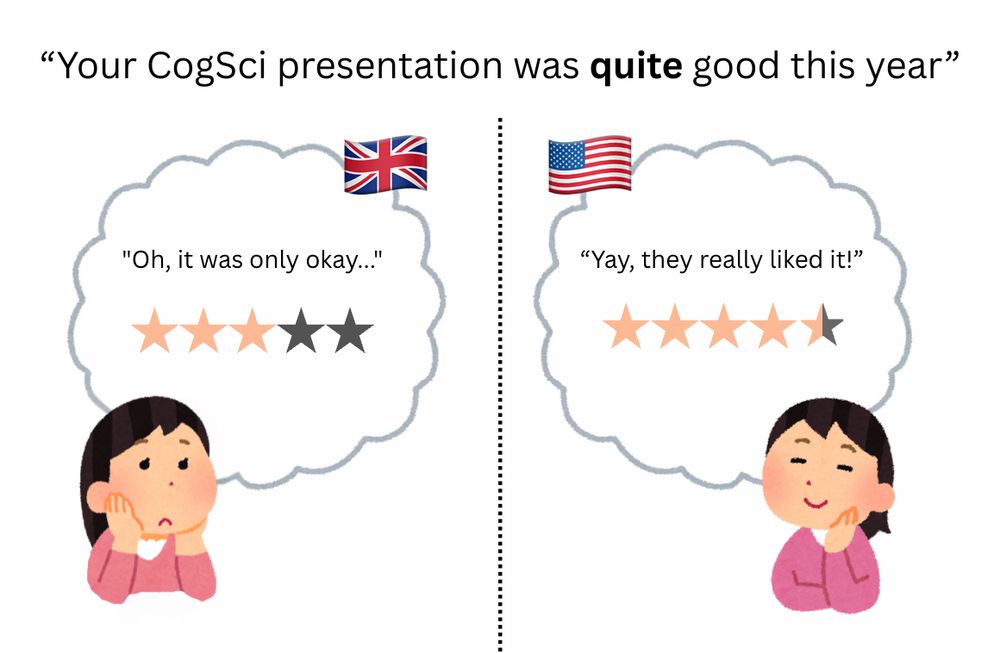That’s interesting!🤔
We also found that the interpretation of modifiers depends on whether it modifies a positive or negative predicate. It would be interesting to study in more detail how context affects the interpretation of the modifier in different dialects.
23.07.2025 20:31 — 👍 1 🔁 0 💬 0 📌 0
And yes, all participants said that English is their primary language
23.07.2025 14:50 — 👍 0 🔁 0 💬 0 📌 0
Yes, I also think there would be a big difference with ESL speakers and native speakers, because context in which you encounter the word in everyday life seems to influence your understanding of the word significantly.
22.07.2025 23:39 — 👍 1 🔁 0 💬 0 📌 0
Thank you!
22.07.2025 23:01 — 👍 0 🔁 0 💬 0 📌 0

Minding the Politeness Gap in Cross-cultural Communication
Misunderstandings in cross-cultural communication often arise from subtle differences in interpretation, but it is unclear whether these differences arise from the literal meanings assigned to words o...
This work provides the first quantitative evidence that cross-cultural variation in interpretation emerges from an interplay of semantic and pragmatic factors.
With @rdhawkins.bsky.social, Matthias Hofer & Max Siegel
Poster presentation: July 31 at #CogSci2025
📄 Full paper: arxiv.org/abs/2506.15623
06.07.2025 04:35 — 👍 5 🔁 1 💬 0 📌 0
These findings have practical implications for cross-cultural communication. When cultural groups assign different meanings AND apply different pragmatic reasoning to the same words, misunderstandings may become more likely.
06.07.2025 04:34 — 👍 6 🔁 0 💬 1 📌 0

On the first point, our results are consistent with the observation that Americans typically interpret "quite" more as an amplifier (quite good = ⬆️ good), while British speakers often read it as a downtoner (quite good = 🤷 moderately good).
06.07.2025 04:33 — 👍 6 🔁 0 💬 4 📌 0
Our model comparisons showed that British and American speakers:
(1) Assign different literal meanings to some modifiers
(2) Apply different weights to informativity vs. social utility
(3) Reason differently about the "costs" of adding modifiers
06.07.2025 04:32 — 👍 3 🔁 0 💬 1 📌 0
Our results suggest both factors play an important role. We extended a Rational Speech Act model of polite speech to explicitly model cross-cultural variation.
06.07.2025 04:32 — 👍 3 🔁 0 💬 1 📌 0

We conducted three experiments examining how people interpret various modified statements like "I'm very concerned" across a range of scenarios. The series of experiments aimed to distinguish social factors (e.g. politeness) from semantic factors (e.g. modifying the strength of the statement).
06.07.2025 04:29 — 👍 4 🔁 0 💬 1 📌 0
The key question: Do cross-cultural differences stem from words having different literal meanings across cultures, or from different pragmatic reasoning about politeness and communication norms?
06.07.2025 04:14 — 👍 6 🔁 0 💬 1 📌 0

🎤 "Your #CogSci presentation was quite good this year."
How flattered or offended will you be? The answer may depend on whether you speak British or American English 🇺🇸🇬🇧. Our new #CogSci2025 paper reveals systematic differences in how different cultures interpret the same words.
06.07.2025 04:12 — 👍 73 🔁 16 💬 4 📌 4
professor at university of washington and scientist at Google DeepMind. computational cognitive scientist. working on social and artificial intelligence and alignment.
http://faculty.washington.edu/maxkw/
Assistant Professor she/her. I study how people think about social relationships. Usually with babies and kids.
ashleyjthomas.com
art & architectural historian / visual, material & religious culture
Assistant professor at Cornell Psychology Department. CoCoCo Lab (Cornell Computational Cognition Lab) @co3lab.bsky.social. I am recruiting!
The official account for the Cultural Evolution Society. Our mission is to promote the study of cultural evolution in research and practice.
www.culturalevolutionsociety.org
Postdoc at Harvard and MIT.
Prof Language Evolution FBA FRSE MAE. Head of Dept, Linguistics & English Language, Uni Edinburgh. With my students & collaborators I do science & art. he/him. simonkirby.net
🔗 https://ryu.sg 🌏Asst Prof @Singapore University of Technology and Design (SUTD) 〜Human cognitive ecology; Human-Centered AI; Cultural evolution 〜 Previously 🇩🇪 ←🇬🇧 ←🇨🇦 ←🇺🇸 ←🇯🇵〆
Researching (social) learning and cultural evolution at Karolinska Institute, Sweden
Postdoc @Stanford Psychology
discourse pragmatics & language development. linguistics postdoc.
clairebergey.net
MIT Brain and Cognitive Sciences
Cognitive scientist studying play & problem solving
jchu10.github.io
Analysing collectives of living dinosaurs. Discoverer of multilevel societies. Watcher of fishers and dolphins. Modeller of emergent phenomena. Caretaker of long term guineafowl, fairywren and chough projects. A/Prof @ Australian National Uni.
Certified bird brain, researching cognitive and social ecology of parrots and parids. Currently holding down a dual position at the Australian National University and the University of Zurich
Postdoc @arc-mpib.bsky.social, @mpib-berlin.bsky.social Interested in human social/group decision-making. Also working as a social media team at ARC. kirikuroda.com/en
Exploring the intersection of culture, evolution, psychology and anthropology. We study how culture and evolution shape human behaviour and society
postdoc at Uni Zurich
studying social learning, social networks and animal culture in birds 🐦 and agent-based models 🤖
https://michaelchimento.github.io
https://soundcloud.com/tek_cashay
ESLR Society is a community for early-career researchers interested in human and non-human animal culture, behaviour and learning. Join for free and subscribe to our mailing list at:
https://www.eslrsociety.com



